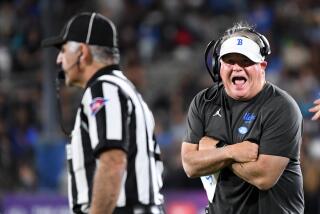He Fought the System. . .And Won : Dartmouth Fired Joe Yukica, but Joe Yukica Fired Back and Regained Job as Football Coach
- Share via
For a long time it has been the custom in college football for coaches and their employers to ignore the terms of their contracts when it becomes expedient to do so.
Coaches routinely depart if they get a better offer.
College presidents routinely fire coaches who disappoint them. If there is contract time remaining, the coach is paid off.
The exceptions are few. Some conscientious coaches serve out their contracts. Others are forced to.
And some institutions have commonly honored their obligations.
Since at least the 1920s, however, most college administrators have held, along with most NFL team owners, that a payoff takes care of the entire responsibility to any coach they wish to can.
This ancient practice was finally challenged this winter by an Ivy League football coach, Joe Yukica of Dartmouth College, who wanted not a payoff but the job for which he had contracted.
When the school’s administrators threw him out, Yukica took one of them, Athletic Director Ted Leland, to court and got his job back.
Dartmouth had told Yukica that he would be reassigned and retained on salary for the last 18 months of his contract, but that he was out as the football coach.
At a Superior Court hearing in New Hampshire, Judge Walter Murphy didn’t reach the underlying issues of the lawsuit, but he did side with Yukica. He found that Dartmouth lacked authority to fire him.
So Yukica is coaching again at the Hanover, N.H., school. At 54, he plans to retire after the 1986 season. This will be his ninth season there and his 21st in coaching.
What did it all prove? Can football coaches with three-year contracts look forward now to serving all three years? Or will some colleges still parlay firings and payoffs?
Yukica, who pronounces his name Yu- kee- kuh, said from Hanover: “Although I’m not a lawyer, I think it will help a few coaches. This is a case that will help the younger head coaches especially.”
He was thinking of them as well as himself when he filed the suit, he said, adding:
“It always bothers me when they give a young guy four or five years on his first contract and then fire him when he has a couple of bad seasons. After building the foundation, he might need only a couple of JC players and a quarterback to turn the corner. His problem is that the administration isn’t close enough to the picture to see this, to understand.”
Asked if there have been many such cases, Yukica said:
“It happens all the time. Not long ago, Cornell brought in an assistant from Stanford, George Seifert, then let him go after two bad seasons. A good, sound coach, George (now a 49er assistant) hasn’t been able to get a head coaching job since Cornell.
“Another case of this kind is Rey Dempsey,” Yukica said, referring to the coach who in 1983 led Southern Illinois to the national championship of Division I-AA. “In 1984, Memphis State hired Rey to a five-year contract but fired him after two seasons. He’s now out of coaching. I just don’t think things like that are right.”
The hypocrisy of it, Yukica said, is that most colleges and universities insist publicly that winning is a bad second to other educational values.
“Then after losing a few games, they turn around and ruin a man’s career,” he said. “It’s very hard for a coach--especially a young guy--to get a second chance when he’s fired after a couple of bad seasons.
“Who knows what really happened? A school needing a coach will hire somebody else, just to be safe. Ordinarily, you can’t get a second chance unless you drop down a division or two--and maybe not even then.”
Yukica spoke not heatedly or bitterly but plainly. Described by his associates as quiet, cordial and cooperative, he is a tall former football player whose pride prompted him to take on a powerful college when, in his view, it had wronged him.
He compares a fired football coach to a doctor who is stripped of his license.
“Coaches work as hard as engineers or dentists to learn their profession,” he said. “They start out at low pay and work their way up, but if they lose their license, what then? How do you re-enter your profession after you’ve been kicked out?”
If coaches had licenses, Yukica’s would show that his teams won or tied for three Ivy League titles in six years before falling on hard times in 1984 and ‘85, when they lost 14 of 19 games.
The downturn is temporary, he believes. He also said that coaches are entitled to only one thing.
“I strongly feel that they’re entitled to the stated number of years on their contract,” he said. “They’ve kept the future in mind while building their team. They’ve made some long-term decisions that might hurt them short term. Then the school steps in and deprives them of the opportunity to finish what they started. All too often, they lose an opportunity that never comes again.”
So Yukica sued.
He and his lawyers thought they had a good case.
And they still think so. They think that’s why they won in Judge Murphy’s court.
“Of course, we realized when we started, that we were swimming uphill,” said Yukica’s counsel, Mike Slive of Hanover. “Everybody told us we couldn’t prevail against established law and conventional thinking.”
Established law in this instance has to do with personal services contracts. Conventional legal thinking is that a football coach’s contract is one of those. And in an argument over a personal services contract, the remedy, as the lawyers say, is money.
That seemed inadequate to Yukica and his lawyers, Slive and David Nixon, a respected trial lawyer from Manchester.
They invoked the doctrine of irreparable harm--a theory that will be mentioned often from now on, no doubt, when coaches challenge the right of employers to pay them off.
Slive, a former assistant commissioner of the Pacific 10 and later assistant athletic director at Dartmouth, said:
“We play Division I-AA football (at Dartmouth). It’s one of the country’s better coaching jobs. If a 54-year-old coach is fired here before the termination date on his contract, there isn’t a high probability that another I-AA institution will hire him. He would be irreparably harmed both professionally and personally.”
Yukica said: “There just isn’t any compensatory figure that covers it. For a man who wants to be a head coach, the opportunities are few at best. It’s depressing to realize that you may never get another chance. Professionally, that’s a blow. Personally, the blows are to your self-esteem, your dignity, your sense of self-worth. If you lose those, what’s left?”
Yukica contends, in other words, that when a coach is fired prematurely, the damage to his psyche plus the damage to him as a professional are irreparable and can’t be redressed by cash payoffs.
Taking the thought a step further, Yukica’s lawyers argued that football coaches shouldn’t be lumped with other kinds of employees who dispute personal services contracts.
The revolutionary aspect of the Yukica lawsuit is that he and his lawyers were basically seeking a change in the law.
“The law does change, as you know,” Yukica said. “Not long ago, the divorced wife of a professional man could only get alimony. This was challenged by a woman who helped her husband through medical school. And today, the law recognizes that a wife like her is entitled to part of the man’s earnings.”
Both sides lose something in divorce cases. And both Yukica and Dartmouth have been harmed by his lawsuit. The college will have to spend a year with a lame-duck coach.
“We’re dealing here with a couple of balancing harms,” Slive said. “So the question one must ask is this: Which party has been harmed to the point where it becomes irreparable?”
Not Dartmouth, obviously. The school will go on.
And, now that he has been rehired, not Yukica either. On his day in court, the coach won.
With a lame-duck coach, has Dartmouth felt an adverse impact on recruiting?
“At a school like this, you can’t really tell,” Leland said. “We don’t have spring training or freshman eligibility. It will be two or three years before we know.”
Yukica said: “No college-age person picks Dartmouth because of the football coach. Quite a few would choose Penn State in order to play under Joe Paterno. But football doesn’t have that kind of impact here. You choose Dartmouth for different values.”
A steadying factor in the recruiting of Dartmouth athletes is the school’s long football tradition.
“We’ve won more games (since the college was founded) than any other Ivy League school,” Leland said.
Yukica said: “We’ve won more Ivy League championships (13) than anyone else. Coaches come and coaches go, but if you are interested in football, you’re impressed by Dartmouth’s tradition.”
He expects his final season to be one of his best.
“We’ve lost our offensive line, but (on defense) our good down linemen are back,” he said. “So are our quarterback, our tailback and our fullback.”
They’re back, that is, from a 2-7-1 team that had finished 2-7 the previous year.
Presumably, the records of 1984 and ’85 were the reasons Leland sought to fire Yukica. Said Leland: “Based on an in-depth evaluation of our football program, I felt a change was necessary to get us going again.”
He acted against a man who had coached Ivy League champions in half of his years at Dartmouth before hitting a slump in 1984. So Yukica said that his beef was strictly with Leland. He sued Leland, not the college.
“Dartmouth is a great academic institution, one of the finest,” Yukica said. “I’m not trying to be disruptive to the college. I’m just after what’s right. They asked me (in a contract) to coach the 1986 season. That’s all I’m trying to do.”
He will apparently do that. The man who wanted a paying job instead of a payoff still has it.
More to Read
Go beyond the scoreboard
Get the latest on L.A.'s teams in the daily Sports Report newsletter.
You may occasionally receive promotional content from the Los Angeles Times.










